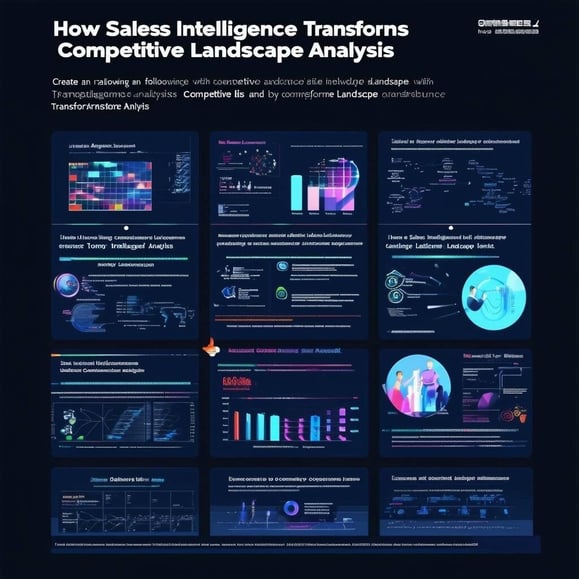
In today's data-driven business landscape, sales intelligence has become a crucial element for B2B companies seeking sustainable growth.
Just as frankincense essential oil provides clarity and focus in aromatherapy, sales intelligence brings clarity to your sales processes and decision-making.
Understanding Sales Intelligence Fundamentals
Sales intelligence encompasses a comprehensive suite of technologies, practices, and data sets that help sales organizations understand their prospects better and make more informed decisions. At its core, it includes detailed company information, contact details, behavioral data, and predictive insights that drive successful sales strategies.
This powerful combination of data and analytics has transformed how B2B companies approach their sales processes, enabling them to make decisions based on concrete evidence rather than intuition alone.
The evolution from traditional sales methods to modern, intelligence-driven approaches represents a significant shift in how businesses operate.
Today's sales intelligence platforms offer sophisticated capabilities that go far beyond simple contact lists, incorporating predictive analytics, AI-driven insights, and real-time data updates that provide a comprehensive view of potential customers and market opportunities.
The Power of Advanced Analytics

Modern sales intelligence platforms have revolutionized how businesses identify and pursue opportunities. These systems analyze vast amounts of data to uncover patterns and insights that would be impossible to detect manually.
By processing information about company behaviors, market trends, and individual decision-maker activities, these platforms can predict buying intentions and highlight the most promising prospects for sales teams to pursue.
The impact of this analytical capability extends beyond mere lead generation. Sales teams can now understand their prospects' needs and challenges before the first conversation, enabling them to prepare more relevant and compelling pitches. This level of preparation and insight dramatically increases the likelihood of successful engagements and helps build stronger relationships with potential clients.
Strategic Implementation and Integration
The successful implementation of sales intelligence requires a thoughtful and strategic approach. Organizations must first establish clear objectives and define specific key performance indicators (KPIs) that align with their overall business goals. This foundation ensures that implementing sales intelligence tools directly contributes to meaningful business outcomes rather than simply generating more data.
Integration with existing systems is crucial for maximizing the value of sales intelligence. When properly integrated with CRM systems, marketing automation platforms, and other business tools, sales intelligence creates a seamless flow of information that empowers teams across the organization.
This integration enables better coordination between sales and marketing efforts, efficient workflows, and effective customer engagement strategies. The modern B2B landscape demands sophisticated approaches to sales, much like how perfumes online platforms revolutionized the fragrance industry through digital transformation.
The Role of Artificial Intelligence

Artificial intelligence has become an indispensable component of modern sales intelligence systems. AI algorithms can process enormous amounts of data to identify patterns and accurately predict outcomes. These capabilities enable sales teams to focus their efforts on the most promising opportunities while automating routine tasks and data analysis.
The predictive power of AI extends to customer behavior analysis, helping businesses anticipate needs and potential challenges before they arise. This proactive approach allows sales teams to address concerns early in the sales cycle and effectively position their solutions.
Plus, AI-driven automation handles many time-consuming tasks, freeing sales professionals to focus on building relationships and closing deals.
Building Customer Intelligence
Understanding customer behavior and preferences has become increasingly sophisticated through sales intelligence platforms. These systems track and analyze customer interactions across multiple channels, providing deep insights into buying patterns, communication preferences, and decision-making processes.
This comprehensive view enables businesses to create more personalized and effective engagement strategies.
Customer journey mapping has evolved from a basic marketing exercise to a sophisticated, data-driven process.
Sales intelligence tools track every interaction and touchpoint, helping businesses understand how prospects move through the buying process and identifying opportunities for improvement. This detailed understanding allows organizations to optimize their approach at every customer journey stage.
Competitive Analysis and Market Positioning

Sales intelligence provides valuable insights into competitive landscapes and market dynamics. By monitoring competitor activities, market trends, and industry developments, businesses can identify opportunities and threats more effectively. This information helps organizations refine their positioning and develop more compelling value propositions.
Strategic positioning becomes more precise with the help of sales intelligence. Organizations can analyze market data to identify gaps in competitor offerings, understand customer pain points, and develop solutions that address specific market needs. This data-driven approach to positioning helps businesses stand out in crowded markets and capture more valuable opportunities.
Future-Proofing Sales Operations
The future of sales intelligence continues to evolve with emerging technologies and changing market dynamics. Organizations must stay ahead of these changes by embracing new technologies and adapting their strategies accordingly. This includes preparing for advances in artificial intelligence, natural language processing, and other emerging technologies shaping the future of B2B sales.
Creating a data-driven sales culture is essential for long-term success. This involves implementing the right tools, developing team capabilities, and fostering an environment where data-driven decision-making is the norm. Organizations must invest in training and development to ensure their teams can effectively leverage sales intelligence tools and insights.
Conclusion
Sales intelligence has become fundamental for B2B growth in today's competitive landscape. By leveraging advanced analytics, AI capabilities, and real-time insights, businesses can create more effective sales strategies, improve customer relationships, and drive measurable results.
Success in modern B2B sales requires a commitment to data-driven decision-making, continuous improvement, and strategic adaptation to changing market conditions.
The future belongs to organizations that can effectively harness the power of sales intelligence to create meaningful connections with their customers while optimizing their sales processes. Businesses can build a strong foundation for sustainable growth and success in the evolving B2B marketplace by following a comprehensive approach to implementing and utilising sales intelligence.